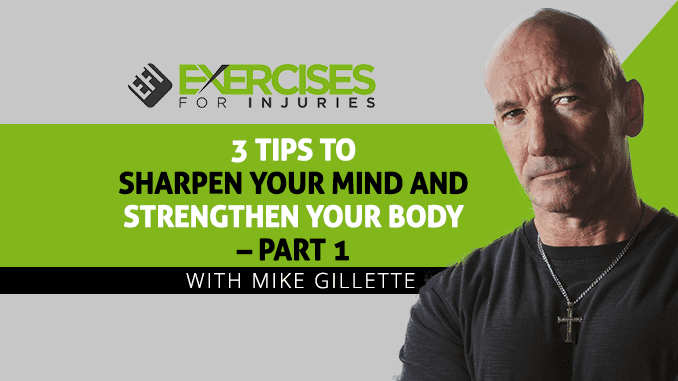
I am coming to you from San Diego… Watch the interview below and get to know the 3 Tips to Sharpen Your Mind and Strengthen Your Body.
It was great to be outside having lunch with Mike Whitfield, Shawna Kaminski, and James Gaida. I have another interesting interview for you about developing mental toughness.
With me is Mike Gillette, who is a record-breaking motivational strongman. Guinness World Records and Ripley’s Believe it or Not documented his notable skill and strength.
Enjoy!
Rick Kaselj, MS
3 Tips to Sharpen Your Mind and Strengthen Your Body with Mike Gillette – Part 1
CLICK HERE to watch the YouTube video interview.
In the interview above, you will discover:
- Who is Mike Gillette?
- Where does his strength come from?
- How can you gain strength by overcoming obstacles?
- What are some mindset issues that lead to mental and physical weaknesses?
- Helpful tips and tricks about mind conditioning when it comes to overcoming pain and strength training
- His approach to how to effectively sharpen the mind
- How much time do you need to sharpen your mind to become a stronger you?
I hope you enjoyed the interview.
If you would like more information on Mike Gillette, you can visit him at MikeGillette.com.
Take care and have a great day.
Rick Kaselj, MS
P.S. – If you enjoyed the interview above, make sure to check out the second part of the interview, here.
If you are unable to watch or listen to the interview, check out the transcript below.
Rick: Hey! This is Rick Kaselj from exercisesforinjuries.com. Today I have another interview for you and with this interview what we’re going to talk about is the Three Tips to Sharpen Your Mind and Strengthen Your Body and it’s with Mike Gillette. And I’ll get Mike to introduce himself before we kind of get into the interview because some people might not know who you are.
Mike: Probably a lot of people don’t know who I am.
Who is Mike Gillette?
Rick: So what can you tell people about yourself or how do you describe what you do?
Mike: Well, I think as it might relate more to your audience, I have explored physical culture really through more of a functional or an operational context. Physical training for me has always been completely related to what I was doing in a professional context for most of my life.
So, it really started when I was preparing for the military and then when I was in the military. I left active duty military in (19)84. And I had a scholarship with the objective of getting commissioned via the Army’s ROTC program. I was attending college, and in my first semester, I was involved in a climbing accident. Broke my back, my ankles. And I’m well familiar with how long, arduous, and frustrating it can be to overcome injuries. Particularly injuries that were supposed to have basically taken me out of the mix physically speaking. Somebody was not supposed to run again. Somebody was not supposed to jump out of airplanes again. But I survived to be both of those things again and more.
Progressing from that I spent time in law enforcement, 12 years, much of my time in law enforcement I gravitated toward training others. And I left law enforcement in (20)01 and was concentrating solely on training subsequent to that. Physical training has always accompanied my various professional endeavors. And then from 2006 to 2011, I was involved in bodyguard work.
Training is a Challenge
While in that little bubble, I’m getting older, and I’m traveling a lot. Training is a challenge. Just eating and sleeping decently is a challenge there. And I sought out a gentleman who does feats of strength. His name is Dennis Rogers. Within that small little community, Dennis is very, very well-known and very well regarded. I was really just interested in how he trained because he was an older guy, smaller even than me. And I just wanted to know how can a guy like him train and not have a constant injury. Because the stress that he subjects his body too is just really hard to fathom.
This is the first guy who ever bent a crescent wrench in half and he’s smaller than me. I’m 5’9”, and I’m 180 something on a good day. So there were a lot of mysteries there for me to try and solve so I spent time with him. I spent time with some of his protégées. And it went from being a research project to really something to kind of transform my life in terms of the types of things. I would find myself gravitating towards goals, not just physically unto themselves. Not just the achievement aspect of that. Although there was an attraction there. It was really the platform that the ability to do those things can afford. So I have taken what I’ve learned from people like Dennis and it’s taken me literally across the country.
Rick: Wow! I’m quite sure with that colorful career you need to write a book. I’m quite sure you have endless stories.
Mike: Actually I have two books coming out but none of which have to do with the stuff that everyone asks me about. They are books that are just informational in nature. I’m not that interesting I just know interesting people. (laughing)
Strength and Abilities
Rick: Kind of branching off the story you had talked about and you said that you know you’re a certain size and then Dennis was a certain size. Now, what do you think is kind of the secret to like Dennis and your ability to do these feats of strength? Because you might be smaller or the same size as someone but you’re able to do something that another person can’t like bending wrenches and horseshoes and all kinds of stuff.
Mike: Excellent question, Rick. It was one of the questions that was always going through my mind very early on because when I was much younger and didn’t know so much about training I looked at training or strength as a mathematical thing. Someone who’s big is probably that much stronger than someone who is not. And yet there are these exceptions that we see, and the more that we look, the more exceptions we seem to find.
Why is it that someone who was Dennis’s size that he can do what he can do and guys who are three times his size simply cannot? And without getting into an extensive physiological analysis of that, I can only speak for myself, and in my case, it comes down really to two things, the first of which is a desire. I have to have a serious, serious desire to do something like that because we’re talking about something that transcends physical strength or force production if you will. Pulling a barbell off the floor is largely motor unit recruitment combined with technique and of course, you know the desire is a big part of that, but it’s so strength related.
Whereas bending something in half that doesn’t want to be bent and that was never designed to be bent is about force production and it’s about something else. It is about overcoming pain. Most feats of strength are not only difficult to do in terms of strength. They hurt. They are physically uncomfortable to do.
The Horseshoe
If you take the example of a Horseshoe, you start off holding it with one hand up and one hand down, and then you jam the edge of the horseshoe (the apex of the curved portion) into the leg as hard as you can to establish a stable fulcrum point. And at that point, you start to try to open up or kink the horseshoe.
Once that is accomplished you then transfer the horseshoe from the side of the leg and you basically stick it right in the base of the pelvis, you know, kind of in the top of your leg and you jam that edge in as hard as you physically can and then you try to open it up all the way and then you’re pushing down into it.
So the steel edge of that horseshoe is going into your leg as hard as possible because if you don’t push in as hard as possible it will not be stable and you will not be able to maximize the amount of force driven into the steel. So what does that mean? Pain. Lots and lots of pain.
If you do not have a sincere desire to bend that horseshoe there are about 80 different times where it would be really reasonable to stop because it’s so uncomfortable. The people who don’t stop are the people who are going to be successful over time. You still have to be strong enough to do it but it’s a combination of those things. So for me, it’s a desire first.
And then number two, it’s the willingness to do whatever is necessary to accomplish this particular task. In my case, I don’t do so many feats of strength that are solely strength dependent. Most of the things that I am known for have to do with overcoming pain or overcoming fear because they’re not just physically uncomfortable they’re also dangerous. So when you’re bending a length of rebar and one end of that iron bar is in your throat, and then you’re pushing against it in order to bend it in half, is that uncomfortable? Yes. Yes, it is.
And if you don’t have a compelling personal reason to do it you’re not going to do it because, A, it’s not that logical to a logical person and, B, it’s uncomfortable. So desire, willingness. You have to have both of those things and you have to meld them together in order to do the types of things that I do.
Overcoming Obstacles
Rick: Okay, but it can relate to a number of things, and it can go back to when you had that climbing accident. In order to overcome those obstacles of broken ankles and broken back, you kind of need that desire and that willingness to overcome pain in order to reach where you’re going or overcome that pain and injury.
Mike: 100 percent, Rick, I love you for making that connection. It’s that sort of big-picture worldview. See? We understand each other. That’s awesome. And when I do feats of strength, to me they are less unique than I think a lot of people sort of see them as because people look at them in this sort of isolated manifestation of something either interesting or unusual or weird or scary or whatever their frame of reference is for that.
To me, the whole point of feats of strength is not so I can amaze myself in my garage and it’s not to go on stage and show off. It’s not, “Hey, look what I can do”. It’s about people understanding who I was once upon a time, a very small, very non-physical person, a very frightened person growing up. And being able to do things that have the look of being impossible because the point is the metaphor.
It’s the object lesson. If a person who really looks fairly ordinary can do something that looks impossible, well what can I do? Well, maybe I can do things that I thought were impossible but maybe that whole notion of impossible really needs to be revisited.
And that’s the point. That’s where I’m going with all of that. I want people to redefine what they think of when they’re considering things that are impossible or simply just really difficult because we live in a culture that does not do difficult well.
Rick: Yes. I have two young boys and you try to instill that, that you’re going to fail a lot and you’ve got to keep going. And try to instill that in them. This is hard. Yes, it’s meant to be hard and you just have to be harder.
Mike: Yes. People don’t say nowadays what people said to us when we were growing up and our parents were growing up which was, you know, stop whining and just keep going because once upon a time everything was hard. Everything’s so easy now that our ability to be resilient and focused and disciplined if we don’t cultivate it actively will decline.
Mental and Physical Weaknesses
Rick: Yes. Now, what are some like mindset issues that end up leading to like mental and physical weakness? It kind of branches off what we were saying, how things have changed from then to now.
Mike: Right. The opposite of everything I just said. That’s what leads to weakness. I think one issue is just simply a lack of focus. It is difficult to be focused in our culture because there’s so much going on, there’s so much background noise, and there are so many things that are entertaining. I mean, here’s my iPhone 6.
This is either the greatest thing in the world or the greatest time-suck in the world and it’s really up to the individual to make it sort of define which is which. And I think distraction has become a real problem for us. So, it’s a lack of focus. And then sort of the inverse of what we were just talking about, it is a lack of will.
We don’t do difficult well and so many things that are meaningful that is truly gratifying are difficult and everyone knows this. It’s not just you and I, it’s not just our grandparents, kids know this, too. For example, you have some activity. There’s a competition or a faux competition. It’s a simulated competition.
It’s got six-year-olds and at the end of the competition, everyone gets a ribbon. Now, that inclination on the adult’s part to give everyone a ribbon comes from a good place, it comes from wanting everyone to feel special and engaged and happy, but even the six-year-old knows that that’s nonsense. They know that this ribbon that says honorable mention or a super special person or whatever it happens to say does not mean what a first, second, or third place trophy would mean. And if there were only three trophies instead of 27 ribbons, those trophies would have a lot more meaning. Yes, some kids would be disappointed, but you know what? You need to be disappointed sometimes.
Otherwise, you will never develop the desire necessary to get you from point A to point B as you progress through life. So, I think that it’s the lack of will. And for most of us, I mean because there’s a lot of ways that we can kind of define people being soft or mentally weak or what-have-you, sometimes people’s problems are only apparent to everyone around them and not to the person themselves. And for anyone to change they need to be at what is termed “threshold”.
This is a term I picked up from one of my hypnosis trainers. And the threshold is simply a realization that number one, something needs to change. Number two, it must be me. And, number three, it must be now. And if you don’t have all three of those components, change doesn’t happen. People don’t do what’s necessary to change because something needs to change. Well, a lot of people know that but sometimes they don’t realize who that person is.
And if someone says, “Hey, I was just at the doctor’s”, he says, “You know, I’ve got XYZ issues. I really need to fix that. I need to exercise more, I need to get my diet under control” but they don’t do it. That’s because they’re not at the threshold. They haven’t decided that it must be now. They know it’s them, they know what the problem is but they just haven’t got that third element there. So, that’s a key issue. People need to be at a threshold in order to change, to make things happen. And if you don’t understand who it is in the driver’s seat, which I think a lot of us don’t, then we just don’t make progress. We don’t figure it out, we don’t take the steps.
Time Investment
Rick: Okay. Awesome. Now, looking at like the time investment, how much time do you kind of need to invest in order to sharpen your mind leading to a stronger you?
Mike: Okay, let me say something before we get into that. Now, when we’re talking about sharpening the mind, first off, I’m good at helping people sharpen the mind in terms of what I would call “sharpening the sword”. If the mind is a tool, we want to keep that tool sharp. I am not someone who suggests that he is an expert at improving cognitive function or anything like that.
So when we say sharpening the mind, I’m not improving your memory, I’m not making you solve algebraic equations faster. I’m more of a habit changer, a lifestyle changer if you will. Toughness, and strength. Those things are what I call lifestyle choices. And you have to decide upon them, you have to choose them and then you have to keep choosing them. That’s what I do. So sharpening the mind in terms of outcomes, that’s what I’m comfortable framing that as.
So, in terms of how much time it takes, I love that you asked that question because you’re a fitness expert. You know, I live in that world and people say, “Geez Mike, I want to do what you do”, to which I was in my head I’m saying, “No, you really don’t. Trust me”, but they’ll say, “But I don’t want to have to live in the gym all the time”.
You know, it’s hilarious to me that anyone would think I look like I live in the gym, but aside from that fact, I don’t live in the gym. I mean, I train hard but nobody lives in the gym. So, it typically, to the outside person, and you know this with your training, it’s typically less time expended than people often think. It’s just that we kind of build these artificial barriers.
It’s like, is it that you want to get in shape or you’re looking for a reason not to go to the gym because you’ve got it built up in your mind that it’s this huge time expenditure when it’s really not? Mental training is the same thing.
Obviously, we get more out of something the more we put into it, but we can have very meaningful results with not that large of an investment. If a person takes just ten minutes a day and focuses on a different particular skill, it can be the same skill for a week, it can be a couple of skills, but pick them out, be deliberate and intentional about that and just work on a particular exercise for up to ten minutes a day and just do that for a month.
Psychology of Strength
I have a DVD workbook course called Psychology of Strength and there’s like exercises in the very back of the workbook and they’re even discussed in detail in the videos themselves. If you would just pick one of those and do it up to ten minutes a day just for a month and then just see where you’re at. It’s like, “Wow! That whole concentration thing Mike was talking about, I mean, yes I can feel it”. And the thing with mental training is you can’t flex it, you can’t wrap a tape measure around it. You’ll feel it.
It’s an experiential thing and you have to live it to get a sense of where the improvements are occurring and ultimately what we want to see is the carryover. It can be a nominal time investment, but just like physical training, it must be consistent. We have to do it. We can’t just like, “Yes, I read through some of those exercises, looks kind of interesting” and then never do them. And that’s not an uncommon thing. We know everything, we just don’t do anything.
Rick: That’s a good point. That’s a really good point.
For your equipment-free workout to lose weight and tone your body, check out the Bodyweight Blender program, here!





